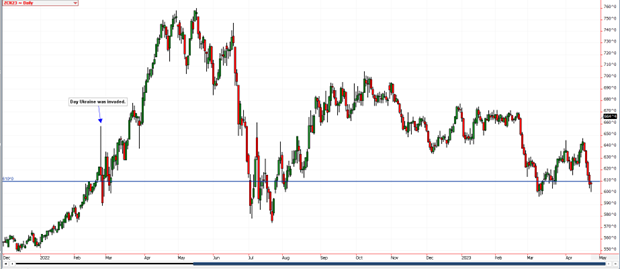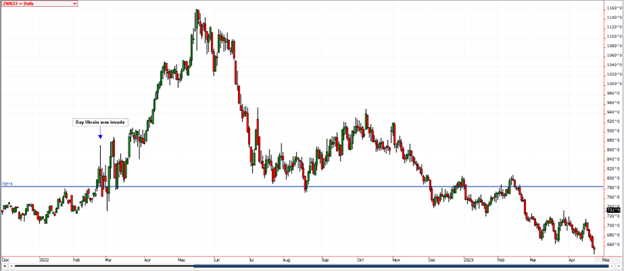
It has been rough few days for market bulls as the Chicago wheat market scored fresh lows and the corn market tested long-term uptrend support just a few cents above the March lows. The July soybean didn't fare much better as they have taken out the long-term moving averages.
Brazil's soybean harvest is almost complete, and hopefully that will stop the slide in soybean prices. The U.S. isn't in the ballpark price-wise in the export market. A world buyer can purchase June cargos of beans for $2.30 a bushel cheaper out of Brazil than from the U.S. Gulf. Brazilian beans for July delivery are currently $1.80 cheaper per bushel than those offered from the U.S. Gulf. As we get into the latter part of summer, the U.S. is more competitive, with Brazil prices being offered $1.20 cheaper than U.S. Gulf for August delivery. If soybean prices are going to rally, it will more than likely be driven by U.S. weather problems or a continued strong US domestic crush demand.
The corn weakness can be attributed to the cancelation of 327,000 mt of U.S. corn sales to China. The cancellation was just a fraction of the millions of bushels the Chinese have purchased from the U.S. in recent months. China has bought 3.53 MMT (140 million bushels) of U.S. corn since the middle of March.
Market bulls need to be cautious that this could be the first of many potential cancellations as Brazil's safrina crop seems to be set up to be a record that will keep Brazil prices cheaper than the U.S. Currently, U.S. prices are $30-$35 over the Brazil price for June delivery and $45-$50 mt for July. Brazil is set to start to begin harvesting the safrina crop in June.
The U.S. export pace is already below where we need it to be to hit the USDA export goal, as year-to-date sales commitments are down 32% from a year ago, with the USDA projecting exports to only be down 25%. YTD inspections are down 36% from last year as well. Each day we don't see more export sales is one day closer to not meeting the USDA sales goal, which would result in an upward revision to the old crop stocks.
Adding to the corn market's export woe is a rising Mississippi River due to rain and snowmelt, which could slow barge traffic and lead to delays and potentially more cancelations.
The July Chicago wheat market scored fresh lows for the move, while the Minneapolis and KC exchanges' July contracts were under pressure but have not taken out the recent lows. This happened despite a good portion of the Wheat Belt getting hit with frost, parts of the hard wheat belt missing out on rains, and the spring wheat crop planting off to a slow start due to snow in the Northern Plains. The managed money crowd continues to add to their short Chicago wheat position adding to the negative market sentiment.
Russia: Crying wolf?
The wild card next month could be the Black Sea grain initiative and if it will stay intact. It is scheduled to expire in less than a month. Recently, Russia has intensified its rhetoric that the deal will not be renewed if its demand for sanctions relief is unmet. But with the G7 talking about increasing the export ban on Russia, the odds of the sanction relief that Russia is looking for will not happen.
If you look at the market's reaction to these current demands, it's been a shrug of the shoulders. The current price of wheat is trading lower today than when the war started. As for corn, it is trading very close to where the value of corn was the day the war started.


You can interpret this as no war premium is left in either of these markets. The market's reaction is like the boy who cried wolf. Russia has threatened to pull the trade out of the deal so many times nobody believes they will.
But a word of caution, especially for end users, sometimes people will tell you what they're going to do, but you don't believe it. As Russia built up its forces along the Ukrainian border, many in the world refused to believe that Russia would invade a sovereign country, yet they did. If the G7 ratchets up the economic sanctions, Russia may feel they have nothing to lose and blow up the grain deal.
If this were to happen, I would expect a violent reaction to the upside as the world would have to reprice exportable supplies of grains from the world suppliers now that Ukrainian products would potently be no longer available for export out of the Black Sea just as they did when the war started.
If we do see a rally over the next few weeks to months, we recommend using it as a selling opportunity. If you have questions, please contact me directly at 815-665-0461 or anyone on the AgMarket.Net team at 844-4AGMRKT.
The risk of loss in trading futures and/or options is substantial and each investor and/or trader must consider whether this is a suitable investment. AgMarket.Net is the Farm Division of John Stewart and Associates (JSA) based out of St Joe, MO and all futures and options trades are cleared through ADMIS in Chicago IL. This material has been prepared by an agent of JSA or a third party and is, or is in the nature of, a solicitation. By accepting this communication, you agree that you are an experienced user of the futures markets, capable of making independent trading decisions, and agree that you are not, and will not, rely solely on this communication in making trading decisions. Past performance, whether actual or indicated by simulated historical tests of strategies, is not indicative of future results. Trading information and advice is based on information taken from 3rd party sources that are believed to be reliable. We do not guarantee that such information is accurate or complete and it should not be relied upon as such. Trading advice reflects our good faith judgment at a specific time and is subject to change without notice. There is no guarantee that the advice we give will result in profitable trades. The services provided by JSA may not be available in all jurisdictions. It is possible that the country in which you are a resident prohibits us from opening and maintaining an account for you.
The opinions of the author are not necessarily those of Farm Futures or Farm Progress.
About the Author(s)
You May Also Like






